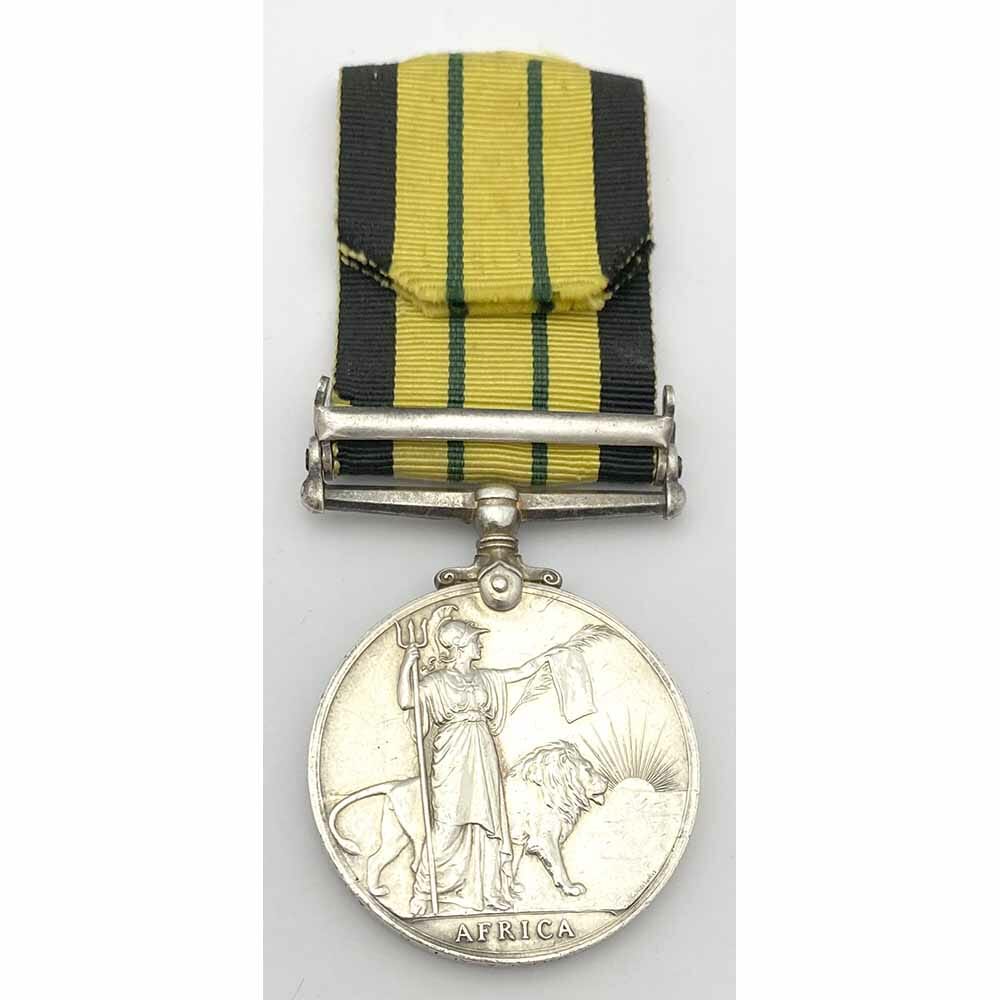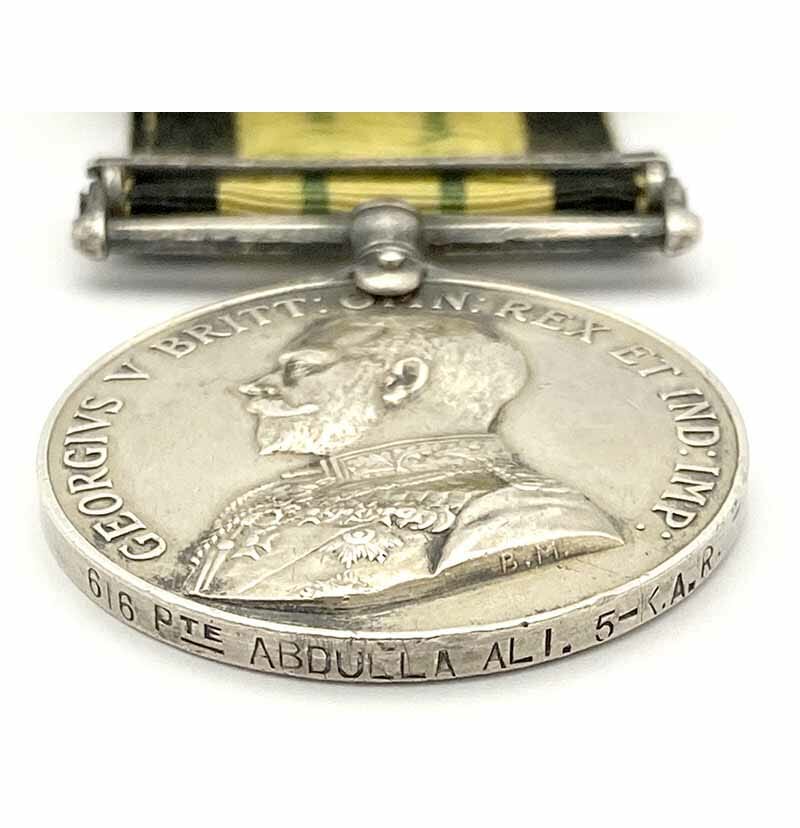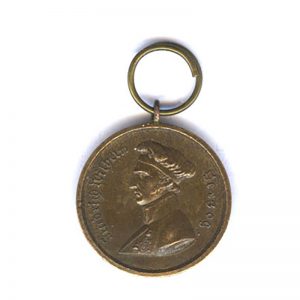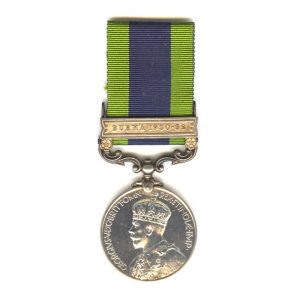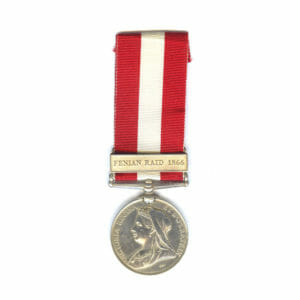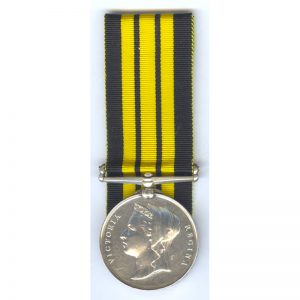Description
Africa General Service Medal, GV, bar East Africa 1918, 616 Private Abdulla Ali, 5th Battalion King’s African Rifles, very rare, confirmed on the roll.
The 5th King’s African Rifles were issued 93 bars for their service in the campaign, a total of 1130 bars were issued, however surviving medals with this clasp rarely appear and only a handful have surfaced in the last 20 years.
Officially impressed: “616 Pte Abdulla Ali. 5-K.A.R.” Confirmed on the medal roll, does not appear to be entitled to any other bars or any medals for service in WW1.
An interesting small punitive expedition, detailed in “African General Service Medals” by R.B. Magor:
“Army Order No 51 of 1920, authorised the clasp East Africa 1918, to all officers and men who served under the command Major R.F. White, Essex Regiment, major H. Rayne, M.C., King’s African Rifles and Captain J.H.R. Yardley, D.S.O, Royal Inniskilling Fusiliers, in the military operations against the Northern Turkana, Marille, Donyiro and Kindred tribes, in the vicinity of the Southern Sudan Boundary to the west of Lake Rudolf between the 20th April 1918 and 19th July 1918.
Patrol 44
This was a combined operation of the Soudan and British East African forces, the former operating from Mongalla-Torit.
Major H. Rayne officer in charge of the Turkana military district & the B.E.A. forces commanded the K.A.R. His temporary rank was relinquished when in the Soudan. Major R. F. White commanded the Soudanese forces.
Total force 20 B.O.s, 9 Soudanese officers, 6 B.N.C.O.s, 1750 O.R.S of which only 550 were fighting men. 2 B.E.A. & 1 Soudanese Political officers. Weapons included a 2½ lb. Hotchkiss, a Stokes gun. There were some preliminary skirmishes before the force marched on 20.4.18.
Yardley was in command of 6 Coy the Equatorial Bn. (the Equats). Major Rayne's force consisted of 300 Askaris of the 5 K.A.R., 250
Sudanese Troops and a company from the Equatorial Battalion and they moved north from the Karua River along the banks of Lake Rudolf towards the Lobur Mountain.
The Turkana, who had been joined by many armed Abyssinians, were brought to action on the 6th May when Major Rayne caught a party of raiders driving off cattle. These were broken up by fire from his Hotchkiss gun and the mounted infantry rounded up the stock. The Sudanese were also in action and by mid-May, 141 enemy had been killed and 4,000 or so donkeys and cattle captured.
A further action was fought with Abyssinians, who although brave and daring, were fortunately bad shots.
The troops returned to base on the 18th June.
The Turkana suffered heavy casualties at the Modo Pass where Lolel the chief witch doctor was killed.
Bimbashi White fought an action at Intonga, there was a skirmish at Kaledeke, Nagya. Capt. Yardley with 70 'Equats,' 30 carriers, 30 levies, 3 Soudanese
officers and 6 servants fought a pitched battle at Kangala. Against some
3-400 regular Abyssinians and levies backed by large numbers of
Turkana who remained uncommitted. The Abyssinians attacked with reckless bravery but were beaten off, many of their leaders were killed and next day they fled back to Ethiopia over the Kibish River. All 3 Soudanese officers were killed and Yardley lost 12 or so killed
whilst at least 33 dead Abyssinians were counted.
Many camels, donkeys and cattle were captured.
After the end of the patrol the Northern Turkana were very much left to their own devices and raids continued during the 1920s. Indeed even in the '60/70s the Kenya Army still had to deal with the 'Shifta' on their Borders.
Stigand, the Governor of the Upper Nile Province and White was killed in November, 1919 fighting the Dinka tribe.
The Medal Roll consists of 195 loose pages, and some 67 medals were unclaimed.”

